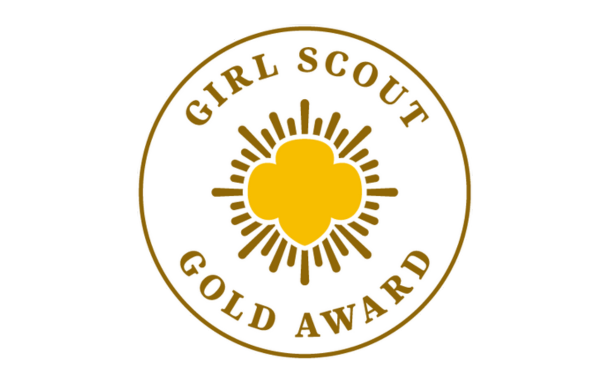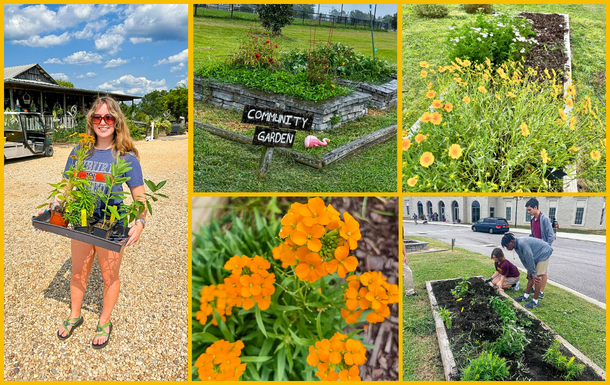Gold Award Girl Scout: Elisabeth Aaij
Elisabeth Aaij has been a Girl Scout with Girl Scouts of Southern Alabama for 12 years. She developed her Gold Award Project to help her tiniest locals. She built a native pollinator garden next to her mother’s community garden, started a club to maintain the gardens, and hosted an educational event about the importance of native pollinators.
The Girl Scout Gold Award is the pinnacle of the Girl Scout Leadership Experience, and it is available exclusively to Girl Scout Seniors and Ambassadors (9-12 grade). Through the Gold Award, girls engage in a rigorous leadership process, tackle issues they are passionate about in order to create long-term, sustainable change. To earn the Gold Award, girls typically spend one to two years exploring the root cause of a local or global issue and partner with the community to create lasting solutions.
Elisabeth gave insights on her life-changing Gold Award Project below.
How did you come up with your idea?
“It started with a Take Action project. My troop replanted the school’s community garden, and I realized how much of an impact a garden could have. I knew that I wanted my Gold Award to benefit my school, and that I wanted a garden. I landed on native pollinators after I watched a movie called Biggest Little Farm, which was about creating a self-sustaining farm and one aspect was having native pollinators. My passion is also sustainable agriculture and I have since become interested in native pollinators.”
Why did you choose this project?
“I chose this project because of the devastation of native species by mass consumption. While food production has larger signs of this, the shift from native pollinators to standardized pollinators has also been extreme. Most people in the South that own pollinators have lantana bushes, the big, beautiful bushes with all of the little flowers. These bushes are from Mexico and tropical America, not from our region. Our native pollinators have been cast aside for these more spectacular flowers, which are damaging our native species. That is why I wanted to make a difference by putting together a native pollinator garden to serve as a waystation for monarchs, but also for native bees to collect nectar from.”
What did you learn along the way?
“I certainly learned the more physical aspects of building a garden. I also learned how to manage my time effectively and how to really organize a large-scale project with several working components. I feel like I have learned how to be a better leader, both at school and in the community, and how to work with other people to reach a common goal.”
Tell us a little story about some part of your project that was special to you. Something funny, touching, most successful, or where it went wrong and how you fixed it?
“When I was planning my event and coordinating that whole day, I would sit in the receptionist's office and work from there. While I was there, I would talk to the receptionist, Ms. Moore, and we would discuss my project and the event. The day of the event came, and the weather was very bad. It was cold, rainy, and windy. My event was outside, so the elements could be felt by all. The time to start came and nobody that had signed up for my event had shown up yet, and I was starting to really lose hope. But right as we were about to push through without the kids signed up, Ms. Moore showed up with her two kids. Her kids and Mrs. Marcie's daughter were the only children there for my event, but they really enjoyed it and had fun. It meant a lot to me that Ms. Moore had brought her kids after hearing me talk about the event for so long, and it really just showed me how important it was to have supportive people like her in my life.”
How will people benefit from your project?
“Hopefully, my garden will continue to draw interest from students, and they will be inspired to learn more about the importance of native pollinators. I also believe that the community vegetable garden will continue to provide for the people in the neighborhood near the school and allow for those people to have access to produce for free.”
How did you feel after you finished your project?
“To be entirely honest, I felt on top of the world. It was the best feeling ever knowing that I had done all of that work, and it was finally done. I was so proud of myself and so happy that I had done something that mattered.”
What advice would you give to other girls considering a Gold Award Project?
“Pick a project that has meaning to you. It makes it easier to put all of your effort and time into this project if you actually enjoy it and find it meaningful.”
Your Gold Project made a change for the better in your community. Did it change you? If so, how? Did you learn new skills, or change your outlook on an issue? What will you take away from this experience?
“I do think my Gold Award changed me. I was previously only interested in major food studies in agriculture but after my Gold Award I realized that I had a passion for native species. Now I am pursuing a career in protection and re-establishment of native species in agriculture. This experience has shown me that any project that has thought and meaning can make a difference. Even though I didn’t save the world or stop climate change, I still provided a waystation for migrating butterflies with native species that have been replaced by invaders. My garden may just be at my school, but it has provided a space for these native species along with educating students about these native species.”
Elisabeth Aaij is from Montgomery, AL, and will soon graduate from LAMP High School. Even though she has her full set of highest awards, she is not done yet. She hopes to continue to work at Kamp Kiwanis like she has for the past two years. And some day, she would like to be a part of a troop as an adult leader. She says, “Girl Scouts has been a constant in my life for years and I want to give back to the program for all that the program has given me.”
Congratulations on earning your Girl Scout Gold Award, Elisabeth!



